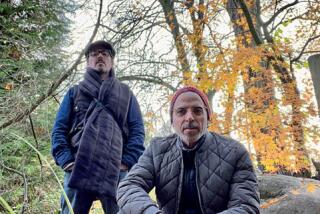Tinariwen: Spreading the Saharan blues wherever it roams
For two millenniums, the nomadic Tuareg people have wandered the Sahara of North Africa. Tinariwen, a Tuareg blues rock collective, chronicles life in the desert and the plight of those displaced by war in song. The band was formed in the military camps of Moammar Kadafi’s Libya three decades ago, and its core members have witnessed and fought in various uprisings around North Africa. Today they channel their experiences through melancholic dirges, poetic lyrics and uplifting anthems powered by electric guitar, all of which can be heard Saturday at the Luckman Fine Arts Complex at Cal State Los Angeles.
“To me, this music is assuf,” says Tinariwen bassist Eyadou Ag Leche, 32, in French. The word “assuf” roughly translates as melancholy that is felt when the Tuareg are away from family, somewhere in the inky darkness far from the light of the campfire. “It’s like heaven for me,” the musician says. “When I need to think about someone I love, or my people, I can be sad with Tinariwen.”
But Tinariwen is proving a slice of heaven for a growing number of listeners around the globe. Since releasing its debut in 2001, the group has garnered critical acclaim and intense interest with each new record (and there are now five). The band now tours year-round, playing huge festivals across the globe, including Coachella in 2009. Tinariwen even hosted a music festival in the Sahara desert in 2001, and fans traveled thousands of miles to attend. However, the band was unable to plan future shows due to threats from Al Qaeda in the region.
For its latest album, “Tassili” (released last month), the band was unable to record in its hometown of Tessalit, Mali, due to political instability brought about by the continuing tension between the Tuareg people and the country’s government, so the group’s members set up camp in the stark canyons and deserts of Tassili n’Ajjer in southeastern Algeria. There, in tents and around campfires, they recorded most of the album with only acoustic guitars and percussion, often outside under a canopy of stars. “I grew up in the desert as a nomad,” Ag Leche says. “It is the quietest place in the world, where the silence is talking.”
Near the end of the sessions, Tinariwen invited TV on the Radio’s Kyp Malone and Tunde Adebimpe, whom they had met at Coachella, to record a few songs. “We got there at night, and drank a bottle of whiskey around a fire, then we were driven out to the cliffs,” Malone says. “We climbed them and looked into forever.”
Tinariwen’s founder, Ibrahim Ag Alhabib, looks much older than his age (51). His untamed gray hair reaches out wildly like tumbleweed, and deep lines carve his face like cracks in dry desert mud.
When Ag Alhabib was just a boy, he witnessed his father’s execution at the hands of government forces putting down a Tuareg rebellion in Mali. Displaced, Ag Alhabib moved across North Africa. He reportedly saw his first guitar while watching a Western film, where a cowboy wielded the instrument. “We didn’t know a lot about American music,” Ag Alhabib says, “but after going around the world, we have met a lot of people playing Western music, and we see how close it was to the way we play the blues.” Anthropologists even trace the lineage of American blues back to slaves who originated from West Africa, the same locale where Tinariwen creates its own recontextualized version of the blues today.
Lyrically, the band provides a pastoral of the desert — thematically akin to classic American folk music and Islamic poetry, and sonically related to Delta blues and minor-key Berber celebration songs. Tinariwen explores human nature stripped of its modern distractions, traversing themes of love and justice, sadness and redemption.
The band first honed its complex sound at military camps in 1980s Libya, which were home to young Tuareg men who had accepted Kadafi’s invitation to join the dictator’s vision of a Pan-African army. Kadafi’s goal was to amass a huge force that could defend against any potential threats to the region. “Back then, [the Tuareg] didn’t know that Kadafi was a crazy person, because we didn’t have any information in the desert,” Ag Leche says. Ag Alhabib and Tinariwen’s original members were also in Libya’s army.
“When Kadafi was in power, his influence was not only on the young Tuareg people, but on all African people,” says Ag Habib. “For us living in Sahara, Kadafi never was important, he never helped the Tuareg population. He only used us to do what he wanted, through manipulation and exploitation. Nobody came back from Libya with something he knows to do, like a profession.” The band returned to Mali in the early 1990s to fight in a Tuareg uprising against government forces, but soon after, Tinariwen’s members put down their guns and turned to music.
Some refugees, such as Ag Alhabib, spent their free time singing familiar Tuareg songs in the camps. Rock and blues music from Jimi Hendrix, the Rolling Stones, Led Zeppelin and other Western icons also resonated as new rebellious anthems for these young Tuareg men. In those tents, backed by generator-powered amplifiers, Tinariwen was formed.
Bootlegs of the band’s cassette tapes spread across the region, eventually falling into the hands of Western music producers in the late 1990s, who unveiled Tinariwen to the world in 2001. Critical recognition and world tours ensued.
Due to touring, members of Tinariwen don’t spend much time in the Sahara today, and they mostly eschew the romantic image of their musician-soldier past. Yet, the political and economic hardship of their homeland stays fresh in their minds. Radical Tuareg fighters, who recently fought for Kadafi during the Libyan revolution, have now returned to the Malian deserts, potentially mobilizing for another rebellion.
Ag Alhabib says Tinariwen’s days of fighting are over. “Tinariwen was born in a turbulent political atmosphere, so this [recent uprising] is not new,” he says, “I am with and in the music today. I will never know fighting again. With our music, we are speaking about our situation and the sanctity of our life in the desert. We are the ambassadors for our people, finding a way to understand the world.”
More to Read
The biggest entertainment stories
Get our big stories about Hollywood, film, television, music, arts, culture and more right in your inbox as soon as they publish.
You may occasionally receive promotional content from the Los Angeles Times.










